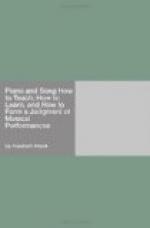We hear from the ladies that they could play their pieces at home before their parents or their teachers; but this is never sufficient to enable them to save their hearers from weariness, anxiety, and all sorts of embarrassment. My honored ladies, you play over and over again two mazourkas, two waltzes, two nocturnes, and the Funeral March of Chopin, the Mazourka and other pieces by Schulhoff, the Trill-Etude, and the Tremolo by Carl Meyer, &c.: “it makes no difference to you which.” You might be able to master these pieces pretty well, but, instead of this, you yourselves are mastered. You become embarrassed, and your hearers still more so: the affair ends with apologies on both sides, with equivocal compliments, with encouragement to continue in the same course, with acknowledgment of fine hands for the piano, with uneasy, forced congratulations to the parents and teacher; but it is always a happy moment when the fatal soiree is over. The next day I am forced to sigh again over the same, miserable, poorly and tediously performed Funeral March of Chopin, and over the timorous B major Mazourka by Schulhoff. The left hand is always left in the lurch in the difficult, skipping basses of this piece, and in others of the present style, which are rich in harmony and modulations. The bass part in this piece is apt to suffer from timid and false tones; frequently the fundamental tone is omitted, or the little finger remains resting upon it, instead of giving the eighth note with a crisp, elastic, and sprightly touch, and the chords are tame and incomplete. You do not give them their full value; you leave them too quickly, because you are afraid of not striking the next low note quickly enough; but, on the other hand, you do not strike it at all, and one missing tone brings another one after it. The right hand, being the most skilful, is supposed to play with expression, and really does so; but this only makes the performance the worse. The fundamental tone is wanting, and you are led to make a mistake in the skip, and strike the wrong key. Finally, the whole thing is ended in terror. I have an uneasy night; I dream of your fine hands, but the false and the weak notes start up between like strange spectres or will o’ the wisps, and I wake with the headache, instead of with pleasant memories.
Allow me to give you a piece of advice. Play and practise the bass part a great deal and very often, first slowly, then quicker, during one or two weeks, before playing the right hand with it, in order that you may give your whole attention to playing the bass correctly, delicately, and surely. Even when you can get through the mazourka tolerably well, you must not think, on that account, that you will be able to play it in company, under trying circumstances. You ought to be able to play the piece by yourself with ease, very frequently, perfectly, and distinctly, and in very rapid tempo, before you trust yourself to perform it even slowly in company. At least,




